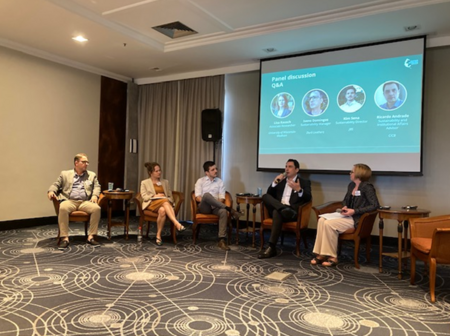12 May 2023

Leather Working Group’s trip into the heart of Brazil and a recap of the South American regional meeting 2023
Our recent trip to Brazil gave members of the LWG team the opportunity to learn first-hand about the challenges and opportunities to develop traceability and deforestation due diligence in the beef and leather sector. Along with a group of global brands and international NGOs, we travelled into the heart of the state of Mato Grosso, one of the major cattle producing regions in Brazil, to visit farms, a slaughterhouse, and a tannery. Following this, we hosted our first of our series of global regional meetings in São Paulo.
We took in beautiful scenery whilst travelling bumpy tracks to meet with farmers and local support organisations committed to developing and sharing best practise on how to conserve natural ecosystems and ensure good animal welfare practises are established. It was striking, however, to learn directly from the farmer about the negligible role the hide plays for them. The farmers had no knowledge or interest in which market the hide went to, with the beef bringing them their income, the quality of the meat was their focus.
This provided an important context for the group, as well as an opportunity for fruitful exchanges between the group and the farmers on the expectations and market demands that are applied to leather products, for the highest level of social and environmental compliance. We witnessed the number of ear tags that many of the cattle have, but then the disconnect at the slaughterhouse stage. This presented the first of many potential opportunities to unite systems, and carry over the crucial data on traceability to the leather.
We also learnt about the complex interplay of cross commodity production for farmers responding to global markets prioritising crops that will provide them greatest financial security. This meant that cattle rearing can be a supplementary or temporary practise on the route to establishing land for growing soy and ultimately cotton. The complexities of regional issues and the role for collaboration across sectors was a strong theme at our South America Regional Meeting.
With the objective to use the opportunity to present and discuss the market expectations and responses to developing traceability, we benefited from the knowledge of two panels of expert speakers. An introduction from the LWG team was followed by various presentations, from WWF US, NWF and the Consumer Goods Forum Forest Positive Coalition, that set the scene on market expectations. A rich panel discussion followed where the impact of upcoming regulation from the European Union on Deforestation-Free products was explored, along with the opportunities for current traceability systems and access to data needed to prove compliance to be improved.
The second panel session delved into the market responses and actions, and featured expert speakers: a representative from the University of Wisconsin Maddison looked at the role of geo-spatial data, a case study from Durli Leathers on their traceability projects was shared, JBS shared insights on the need and business case for developing the Chain of Custody for material processed in LWG certified sites, followed by the view from CICB, the Brazilian leather trade association, on their efforts to build engagement with the Brazilian Government.
We were delighted to welcome a diverse cross section of stakeholders to engage together and focus on traceability with many collaborations strengthened, new connections made and many threads of for continued discussion identified.
Reflecting on our opportunity to spend time in Brazil reminds us of the value of meeting in person. We are immensely grateful for the immeasurable hospitality we encountered, and we look forward to continuing to foster the relationships we have with stakeholders throughout South America and working to build and secure a world where leather is sourced, produced, and used sustainably, protecting people and the planet.
Please look out for more details about our next regional meetings in Milan on 21 September 2023 and Hong Kong in 2024 (date to be confirmed).

